
McCain Institute Board Members Condemn Russia’s Ukraine Invasion
Sheeran, Esper, Ayotte, Townsend, Massimino Speak Out Against Vladimir Putin’s Invasion of Ukraine WASHINGTON, D.C. – Members of the McCain Institute’s Board of Trustees today
There was no other U.S. statesman who advocated for Ukraine more than Senator John McCain. In 2014, as Russia began its takeover of Crimea Senator McCain said, “We are all Ukrainians,” as he urged America and the world to oppose Vladimir Putin’s theft of land from a sovereign Ukraine. Senator McCain believed a free and democratic Ukraine would be a bulwark against Putin’s authoritarian regime in Russia and something that emerging states around the world could aspire to. As a senator, he rallied with protesting Ukrainians in Kyiv and constantly pressed his colleagues in Washington to support the Ukrainian people against Russian aggression economically and militarily. With Ukraine currently under attack – again by Vladimir Putin and Russia – we are driven by Senator McCain’s want of freedom and democracy for Ukraine to support them in defense of their homeland. The Ukrainians are standing up for a cause greater than themselves – the cause of freedom, epitomizing what it means to defend democracy.
Vladimir Putin wants to restore the old Russian empire. He cannot stand a free, democratic, prosperous Ukraine, because sooner or later, the people of Russia would want to have that kind of lifestyle as well.
Senator John McCain, 2014 Tweet (Open Link in new window)

Sheeran, Esper, Ayotte, Townsend, Massimino Speak Out Against Vladimir Putin’s Invasion of Ukraine WASHINGTON, D.C. – Members of the McCain Institute’s Board of Trustees today
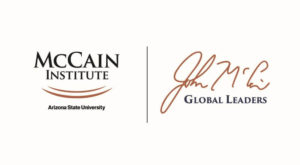
WASHINGTON, D.C. – Members of the McCain Institute’s McCain Global Leaders Alumni Advisory Board today released the following statement of solidarity with Ukraine: “We, as

WASHINGTON, D.C. – The McCain Institute at Arizona State University today released the following statement from John S. McCain Distinguished Fellow and former U.S. Secretary
Thank you, friends of the McCain Institute, for the success of the first-ever hybrid Sedona Forum. With the theme of “Strategic Competition,” speakers at the Sedona Forum 2022 included Chairman of the Joint Chiefs of Staff General Mark Milley, U.S. Special Operations Commander General Richard Clarke, former U.S. Defense Secretary Dr. Mark T. Esper, World Food Kitchen CEO Nate Mook, a bipartisan delegation of 16 U.S. senators and members of Congress, U.S. Trade Representative Ambassador Katherine Tai, FBI Director Christopher Wray and many more experts, policymakers, humanitarians and defenders of democracy.
The Sedona Forum also partnered with The Washington Post to call attention to our joint efforts to ensure democracy does not die in the darkness.
from around the world
represented among speakers
Lorem ipsum dolor sit amet, consectetur adipiscing elit. Curabitur interdum nec ligula in dictum. Nunc aliquet ligula at mauris sollicitudin tincidunt. Aliquam eget felis ut tellus sagittis semper vel a elit. Mauris non gravida orci. Integer ut varius libero. Donec congue imperdiet dignissim. Nam feugiat lectus hendrerit turpis sagittis, vel fermentum ex sodales.
In partnership with the Anti-Defamation League and the Institute for Strategic Dialogue, we are building a national network of interdisciplinary professionals dedicated to addressing targeted violence and terrorism, and its impacts, within the United States. This network is both increasing the efficacy of local prevention frameworks and programs and expanding referrals to qualified programs throughout the country.
In a joint effort with the Center for American Progress, we conducted interviews, round table discussions, surveys and research to inform a comprehensive national policy blueprint, designed to serve as a starting point for a whole-of-government response. This blueprint focuses areas of broad consensus, providing dozens of recommendations that Congress, the Biden Administration, and partners at the state and local level can pursue to counter white supremacist violence.
Expanding on the Peer-to-Peer initiative, we partnered with EdVenture Partners and Credence Management Solutions to challenge university students to develop their own dynamic products, tools, or initiatives to prevent targeted violence and terrorism. University teams compete for cash awards, education scholarships, and optional entry into a one-year sustainment program.
In October 2020, the U.S. Department of Homeland Security concluded that racially and ethnically motivated violent extremists, particularly white supremacist extremists, are “the most persistent and lethal threat in the Homeland.” The UN also identified violent extremism as the “number one internal security threat in several countries.” In response to this threat, the McCain Institute established the Preventing Targeted Violence program, which facilitated student innovation contests on 46 campuses, developed a Prevention Practitioners Network, and crafted a comprehensive Policy Blueprint to End White Supremacist Violence. In its first year, the PTV program has grown into one of the Institute’s most notable programs.
facilitated across the universities and high schools in three countries
conducted to disseminate recommendations from the Policy Blueprint to End White Supremacist Violence
in the first nine Prevention Practitioner virtual workshops
of Prevention Practitioner workshop and symposium video recordings
Preventing and reducing the impact of domestic terrorism and hate-based violence requires actions from character-driven leaders, no matter their role. To empower changemakers to disrupt extremism, our work builds broad, bipartisan support among policymakers, centralizes resources for practitioners and nurtures innovation among college students.
The McCain Institute created the first national network of interdisciplinary professionals dedicated to addressing targeted violence and terrorism, and its impacts, within the United States. This network is increasing the efficacy of locally based prevention frameworks and programs and will expand referrals to qualified programs throughout the country.
In 2021, the network hosted 9 virtual workshops and one virtual symposium, convening international and domestic experts on diverse topics, from Needs, Risk, and Threat Assessment to Staffing Multidisciplinary Teams in the Prevention Space. These experts explore existing frameworks, lessons learned, and promising practices they incorporated into their work. To date, over 433 violence prevention and intervention professionals have registered for our virtual workshop series and expressed interest in joining the national network, while 98 practitioners participated in the 2021 Fall Symposium Workshop. Workshop and symposium recordings have garnered over 2,045+ views combined.
Sponsored by DHS’s Center for Prevention Programs and Partnerships, Invent2Prevent (I2P) challenges students at universities and high schools across the U.S. to develop their own dynamic products, tools, or initiatives to prevent targeted violence and terrorism.
Since Spring 2021, 78 universities across 28 states and the District of Columbia have participated in I2P, including teams from 3 HBCUs and from 11 universities serving majority Black and brown populations. In Fall 2021, 20 university teams competed in I2P. The top three teams featured in the final competition were the Peace Coalition at Howard University, Diverting Hate at Middlebury Institute for International Studies,= and Witz at the University of South Carolina. Twenty-eight university teams are currently participating in the Spring 2022 program.
To meet increased demand for prevention programming for a younger audience, the McCain Institute also launched a yearlong pilot program in 27 high schools across 16 states. This included creating customized lesson plans for high school faculty to teach students the social-emotional skills and prevention theory critical to designing, implementing, and measuring the impact of team projects in their communities. In June 2022, finalists from universities and high schools will be invited to D.C. to compete for cash awards, education scholarships and optional entry into a one-year sustainment program.
Following the success of the Peer-to-Peer: Creating a Message Against Hate program in France during the spring 2021 semester, the McCain Institute secured funding from the Department of State to launch an Invent2Prevent (I2P) program in both France and the U.K. Now known as Invent2Prevent France and Invent2Protect UK, both programs empower university students to address hate-based violence in their respective countries and communities. The I2P France program will focus on preventing anti-Semitism, as well as racially and ethnically motivated acts of targeted violence and terrorism. The I2P UK program will focus on preventing right-wing extremism, misogyny, online radicalization and recruitment, and racially and religiously motivated acts of targeted violence and terrorism.
Six teams in France and six in the U.K. will receive funding to design and implement a product, tool or initiative with measurable results. In June 2022, teams will compete against each other for awards to continue their projects.
From raising awareness through the R.E.A.L. Friends Don’t campaign to training law enforcement, service providers and school personnel in Arizona, our team takes a dynamic and innovative approach to building capacity and support for vulnerable populations locally, nationally and globally. The fight against modern slavery continues to be a significant priority of the Institute.
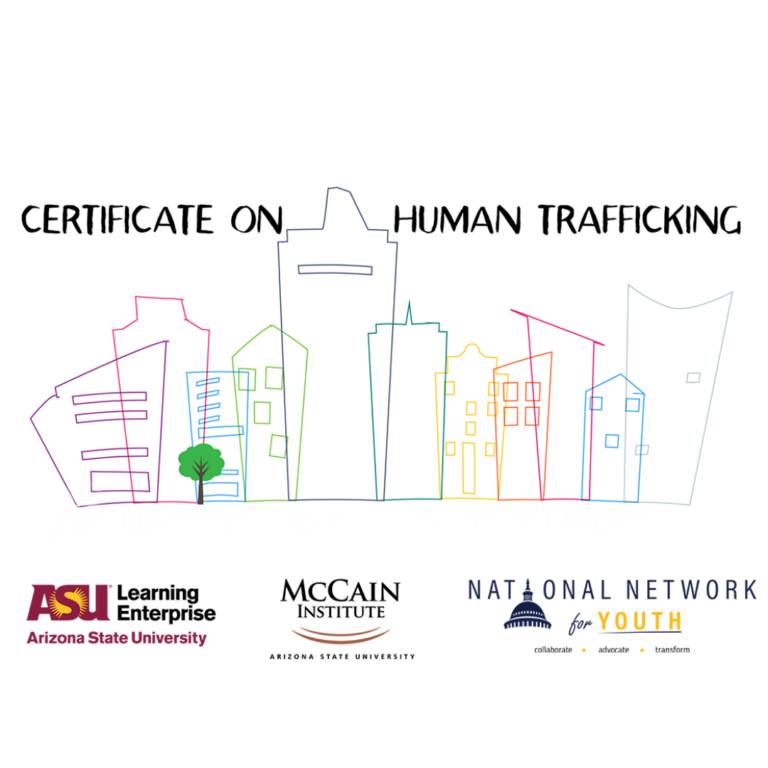
Developed in close collaboration with an Advisory Group of leading researchers and experts on human trafficking, youth homelessness and child welfare, the McCain Institute’s online Certificate on Human Trafficking is now open for enrollment. The two-course sequence introduces learners to the fundamentals of human trafficking, and offers specific techniques and approaches to best identify and respond to potential cases of trafficking.
One of the many long-term consequences of COVID-19 has been the sharp increase in the number of hours that school-age children are spending online and, concurrently, an increase in reports of online child sexual exploitation. In response, the McCain Institute was proud to launch R.E.A.L. Friends Don’t, a national safety campaign focused on increasing awareness and empowering parents, caregivers and young people to protect themselves and their loved ones from harmful content, grooming or online exploitation.
Having reached over 2.3 million people in one year, the R.E.A.L. Friends Don’t campaign is taking a unique approach to educating vulnerable populations about online safety. Through social media, outdoor advertising and public art, our nationwide campaign is transforming the way in which we prevent online exploitation.

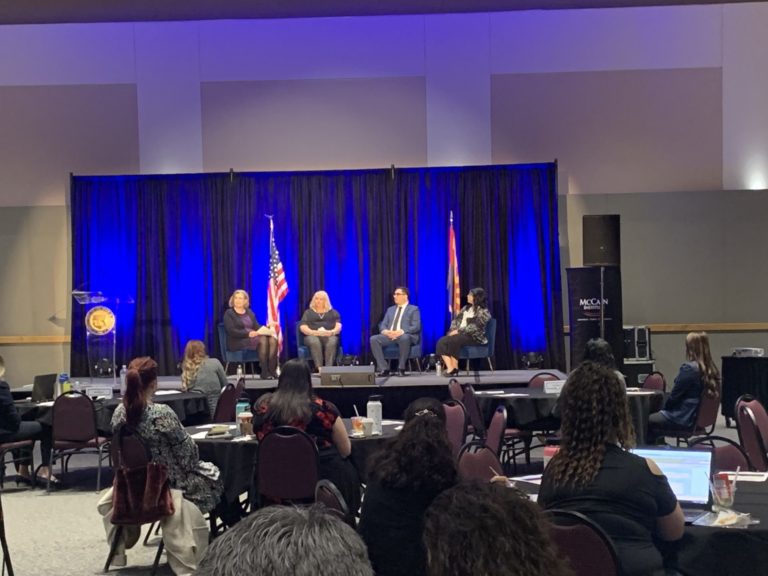
To ensure a coordinated victim-centered response to exploitation, whether through sex or labor trafficking, we know that consistent and comprehensive training and opportunities to build anti-trafficking networks that span sectors are critical. The Arizona program focuses on building capacity through a dynamic approach to training and convenings that removes barriers to access, whether the offering is in-person, virtual, hybrid, or a web-based asynchronous course. Leveraging local expertise and individuals serving on the frontlines of identification, victim services, investigation, and prosecution, we have trained over 3,900 stakeholders over the years. We are thrilled to continue to build upon the knowledge and experience of our communities to ensure victims and survivors have the resources to thrive.
There has never been a more important time to advocate for human rights and democracy, in the United States and around the world. Our program continues to bring human rights to the forefront of conversations in Washington, D.C., and protect human rights activists around the world.
Hosted by 4 working groups to discuss problems and solutions that affect today’s foreign policy.
Hosted by the Women, Peace and Security Initiative to advance the WPS agenda across governments.
By the We Hold These Truths campaign to promote activism among American youths.
With the COVID-19 pandemic, Human Rights Defenders faced unprecedented challenges in both operations and magnifications of injustices. While our authoritarian regimes imposed restrictions limiting travel and safety, the Human Rights Defenders Program still succeeded in supporting brilliant and resilient activists around the world.
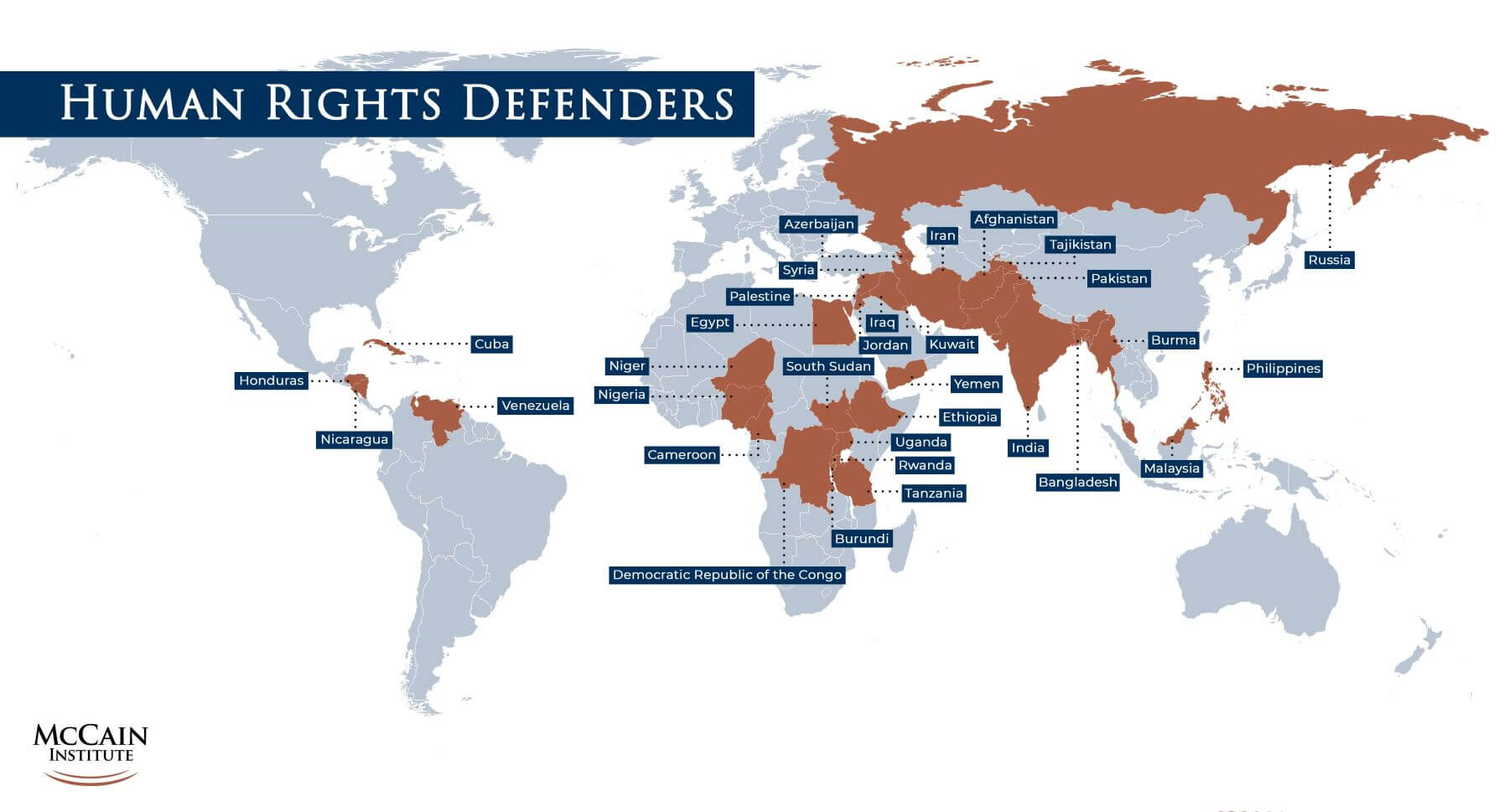
We’ve been working with an award-winning, investigative journalist from Nicaragua, whose report had an enormous impact in Nicaragua and internationally. The United Nations High Commissioner for Human Rights took up the findings of his investigation in their respective reports on Nicaragua, and used it to determine the government's crimes against humanity.
The Human Rights and Democracy program hosted its inaugural Human Rights and Democracy Summit in conjunction with the White House’s Summit for Democracy.
The Perils of Defending Democracy: Perspectives from Around the World
Democratic norms and human rights are under attack around the world and human rights defenders are at grave risk. The McCain Institute convened journalists and activists from Russia, Turkey and Venezuela to share the threats they face, their first-hand experiences and their expectations of the U.S. government.
Introduction:
United States Senator Chris Coons (D-DE)
Participants:
Barış Altıntaş (Turkey) – Journalist and civil society professional. Founding president and co-director of the Istanbul-based Media and Law Studies Association (MLSA)
Roman Badanin (Russia) – John S. Knight Senior International Fellow at Stanford University, and the founder and editor-in-chief of the recently established investigative media outlet Agentstvo (agents.media) and former editor-in-chief of investigative outlet Proekt
Carla Angola Rodríguez (Venezuela) – Multimedia journalist with a career spanning over 20 years and millions of followers on social media
Paul Fagan – Director of the Human Rights and Democracy programs for the McCain Institute for International Leadership at Arizona State University
Committed to continuing Senator McCain’s legacy of character-driven leadership, the McCain Institute empowers individuals around the world to educate others in the Institute’s leadership curriculum.
for the inaugural McCain Global Leaders Program
in the inaugural McCain Global Leaders application pool
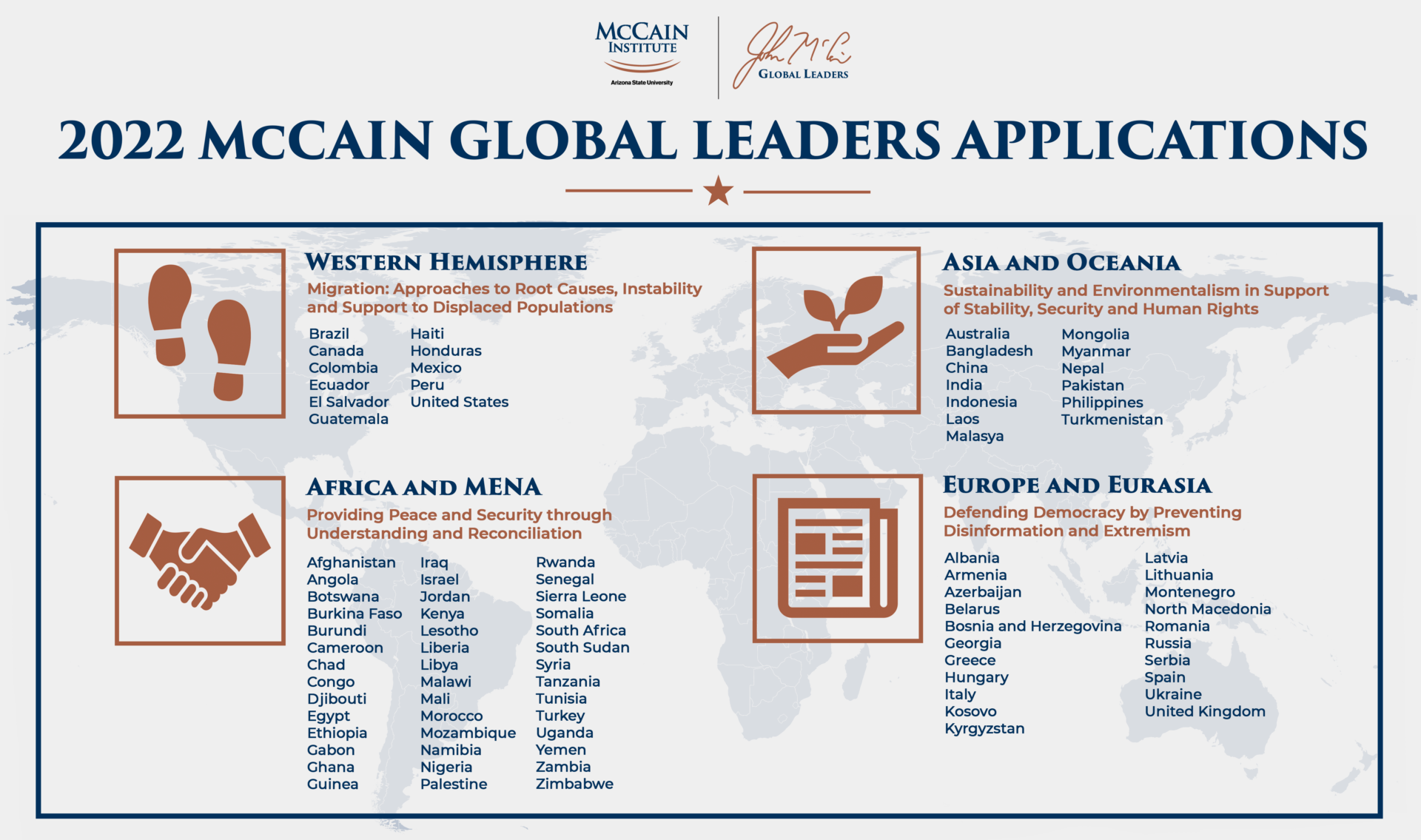
The McCain Global Leaders Program supports character-driven leaders from around the world who embody Senator John McCain’s legacy of serving a cause greater than oneself. Structured as a 10-month fellowship and experiential learning experience, the inaugural cohort will feature 26 diverse leaders from around the world who are working “in the arena” to advance democracy, human rights and freedom. The program is designed to advance each Leader’s personal and professional leadership journey and impact by providing training, resources, and access to highly relevant regional and global networks with goal of preparing today’s leaders to meet tomorrow’s challenges. The inaugural cohort will be announced later this spring.
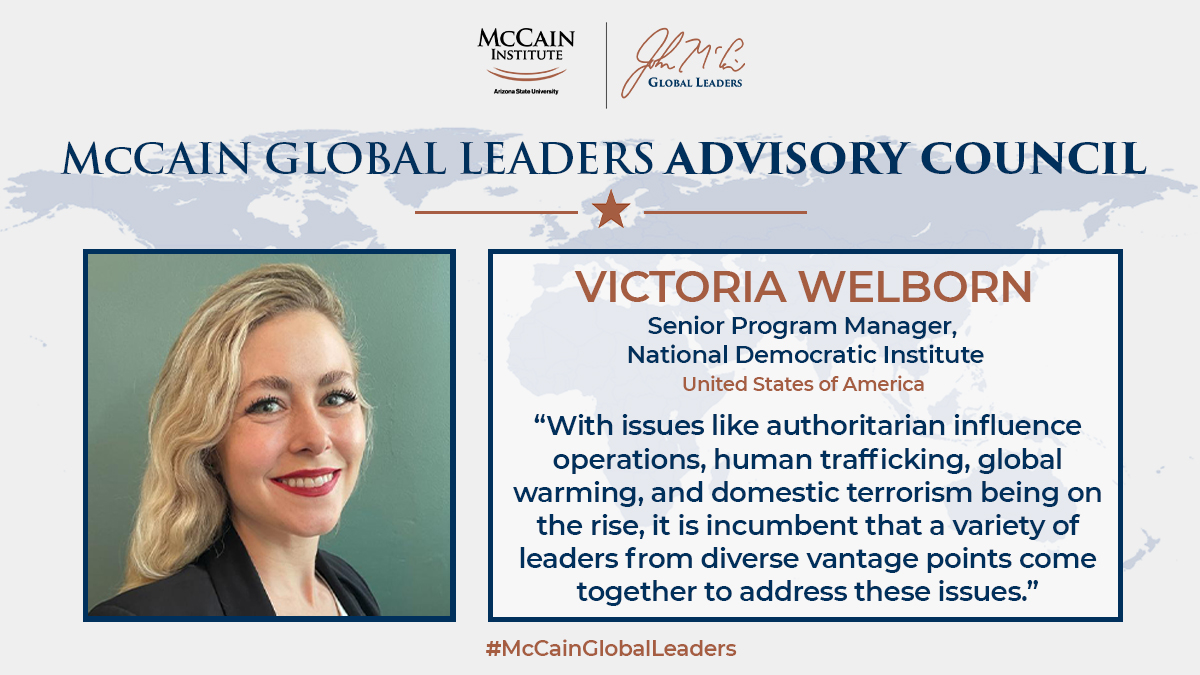
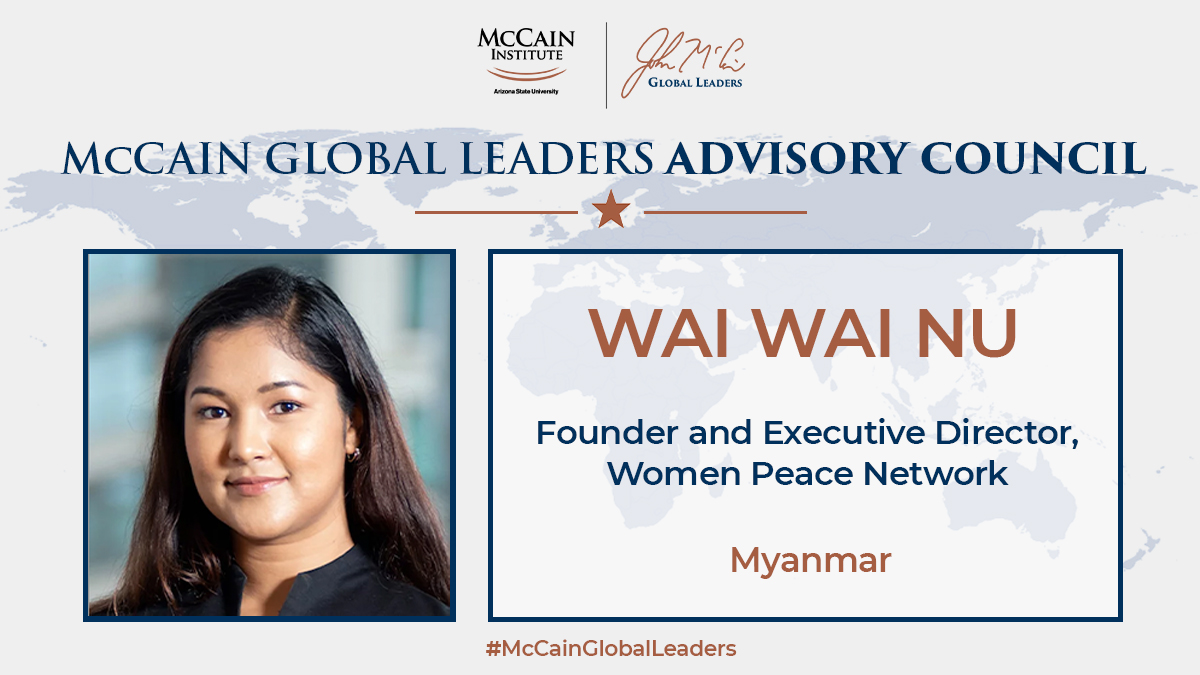
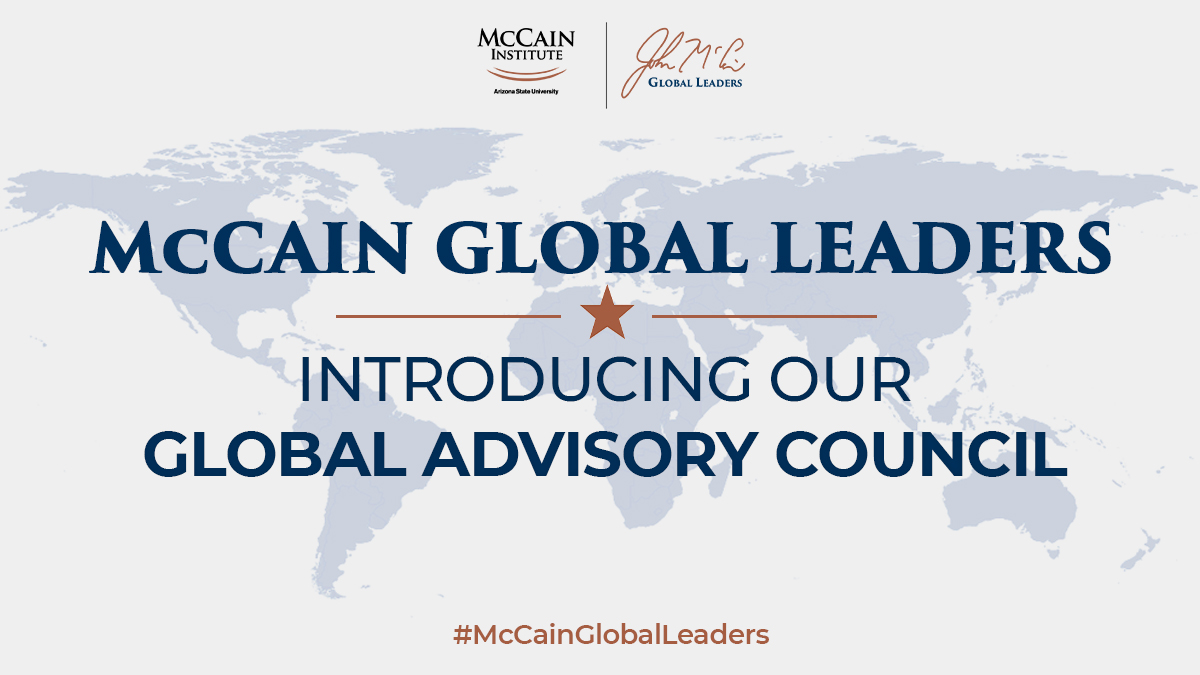
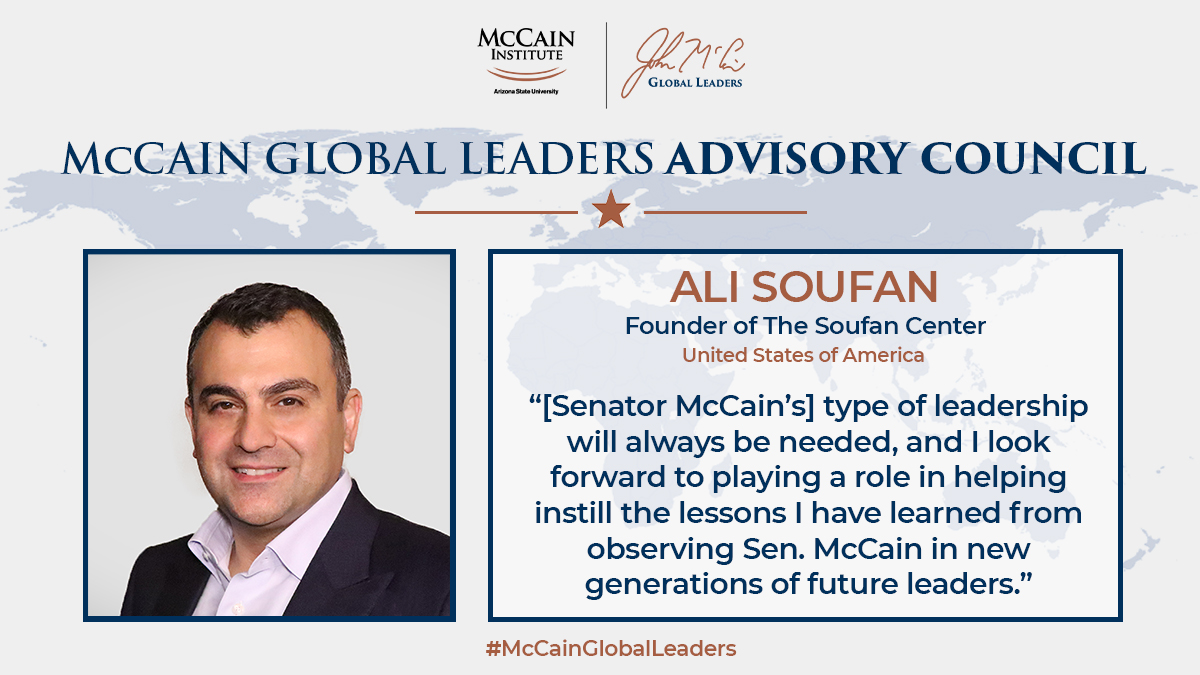
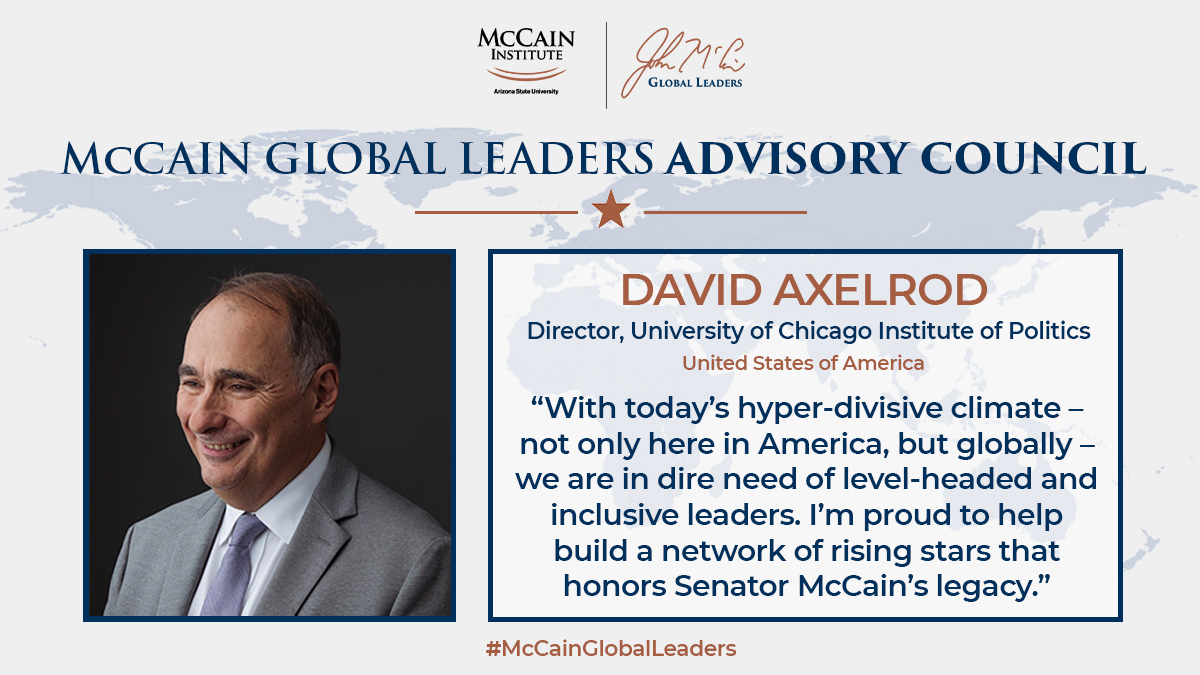
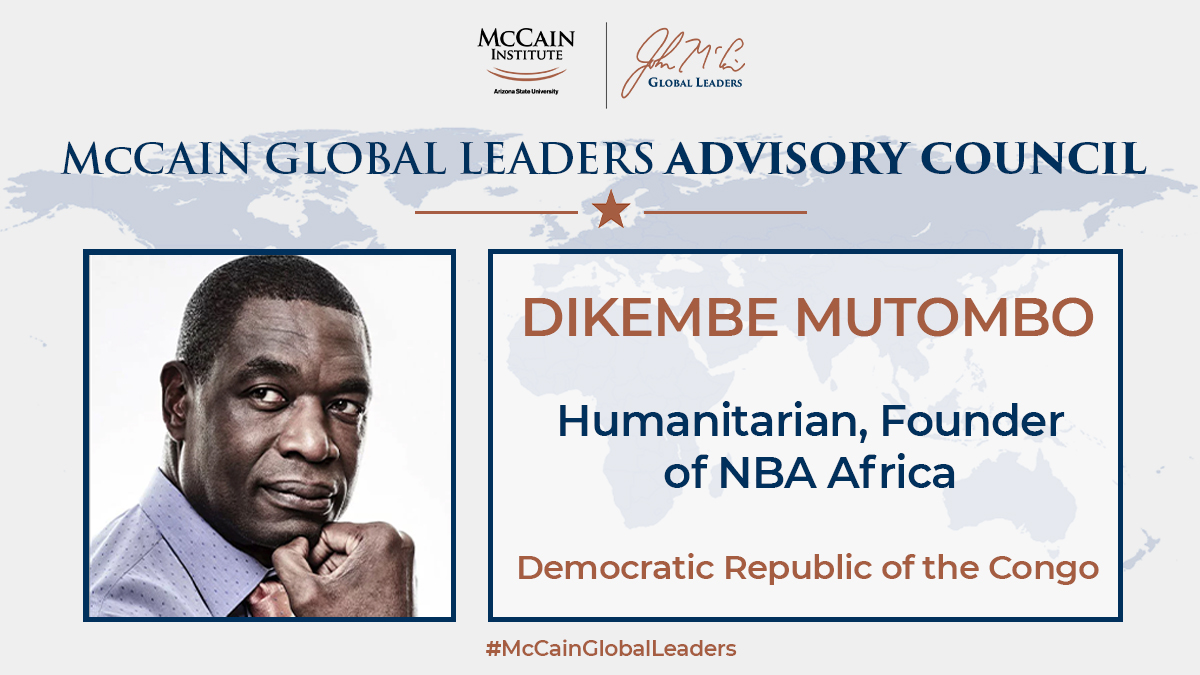
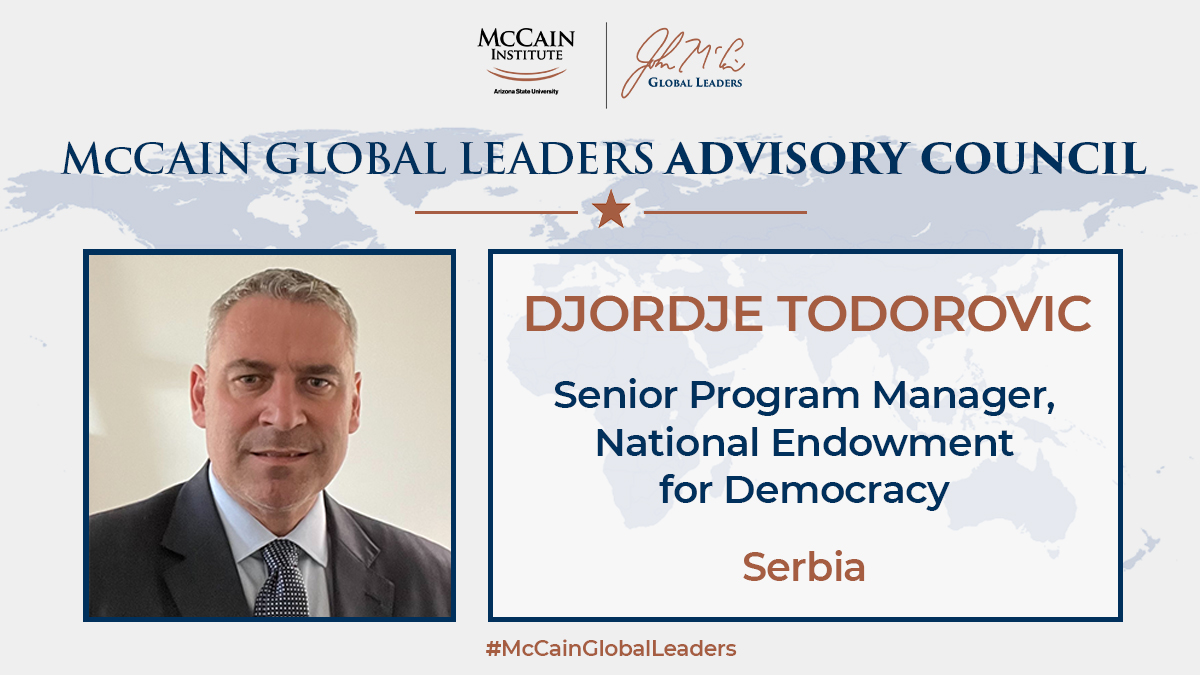
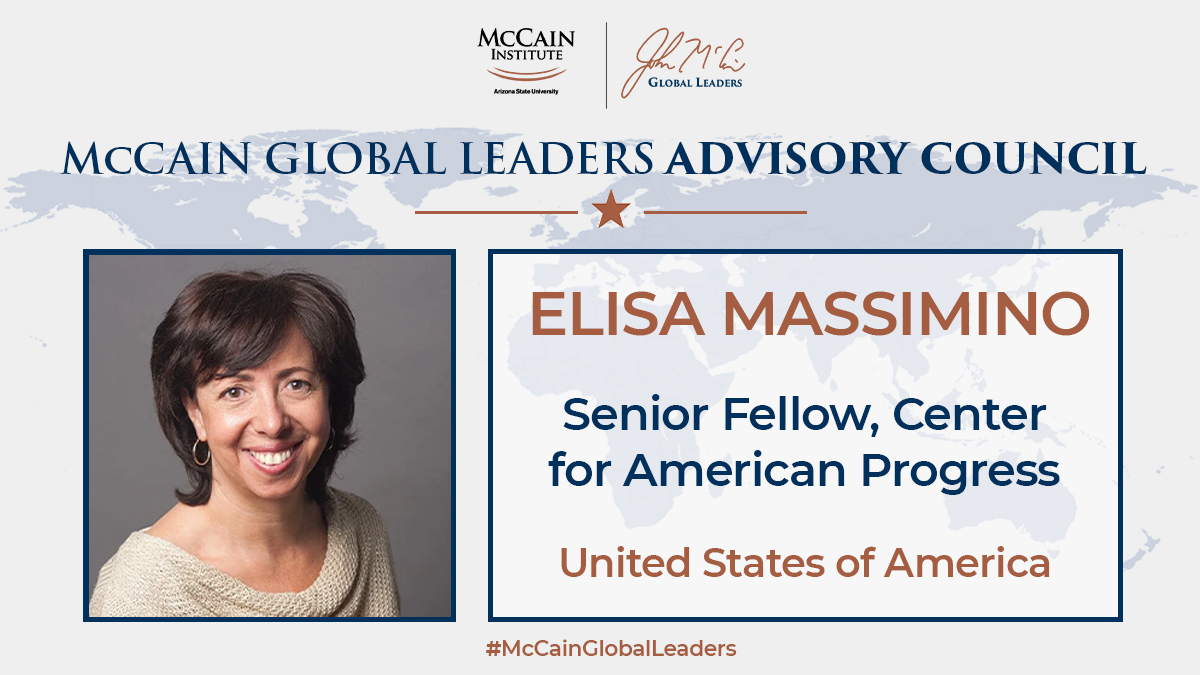
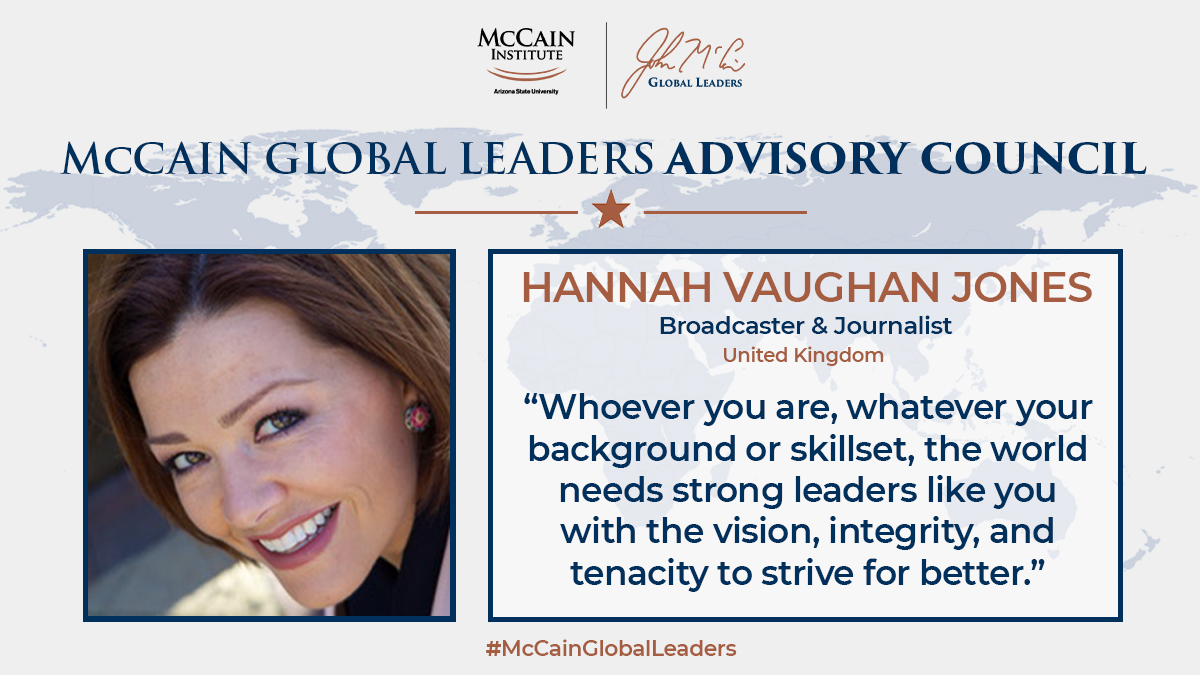
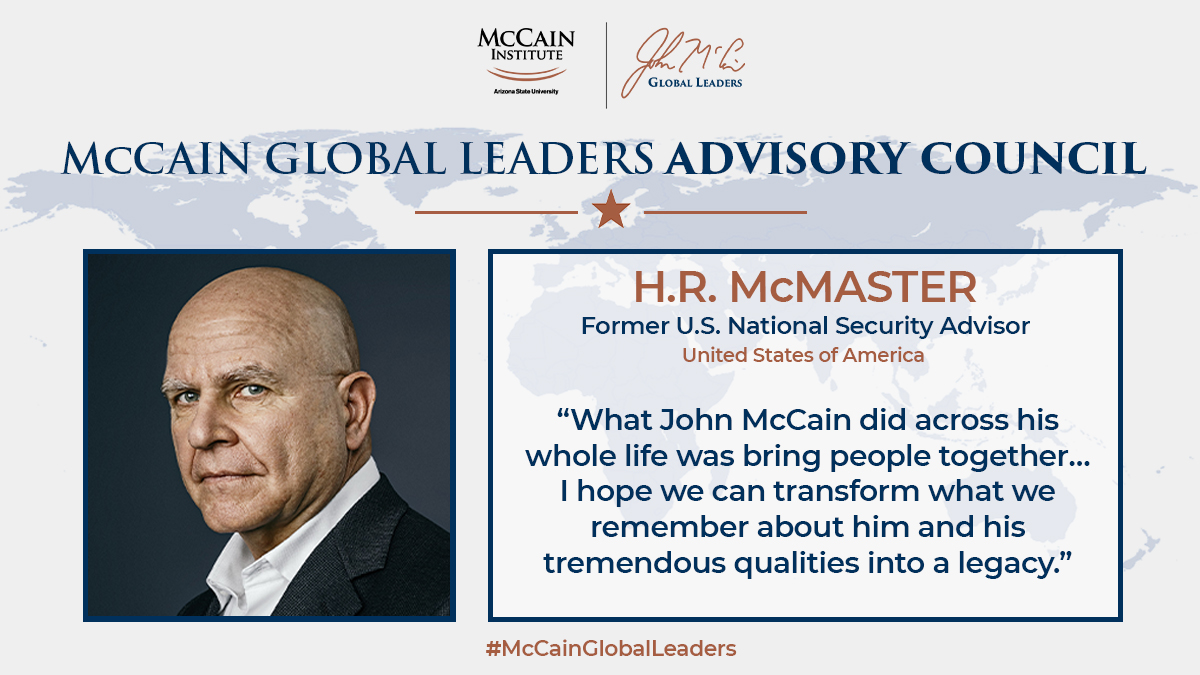
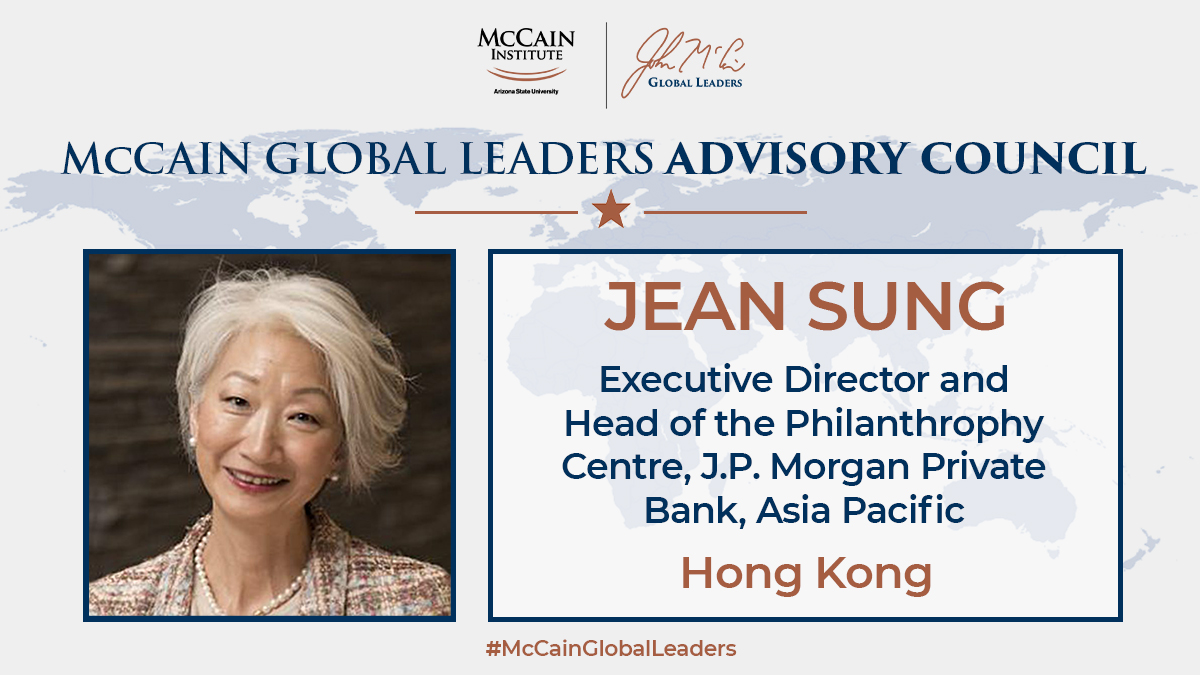
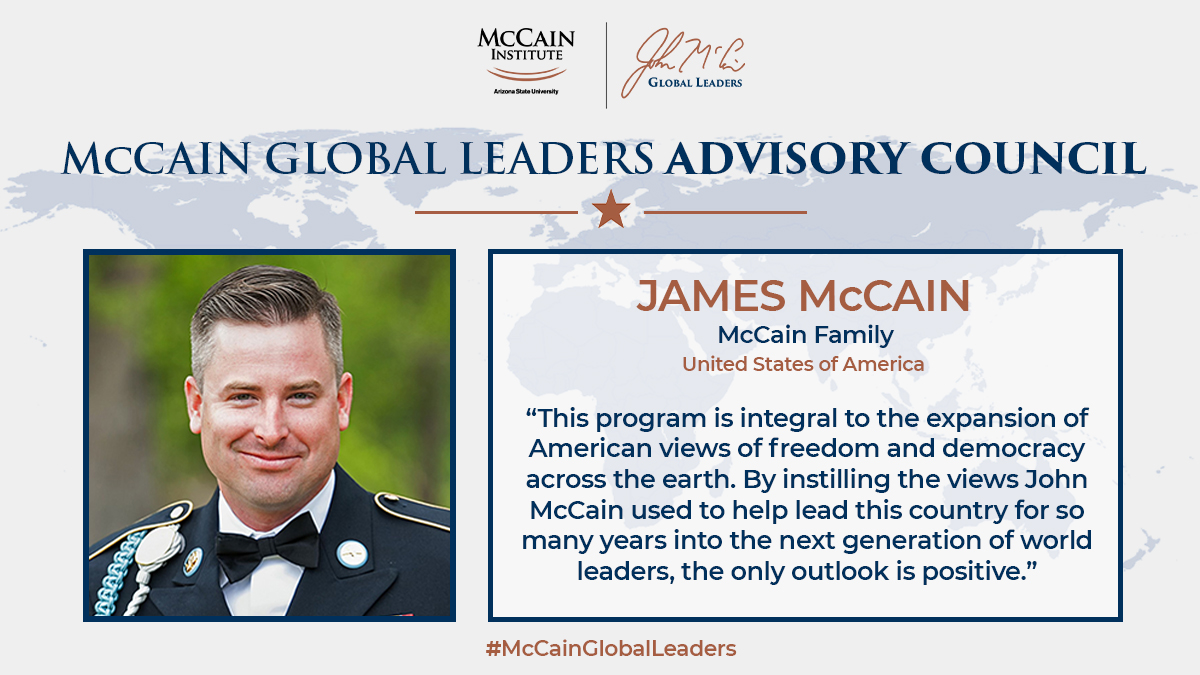
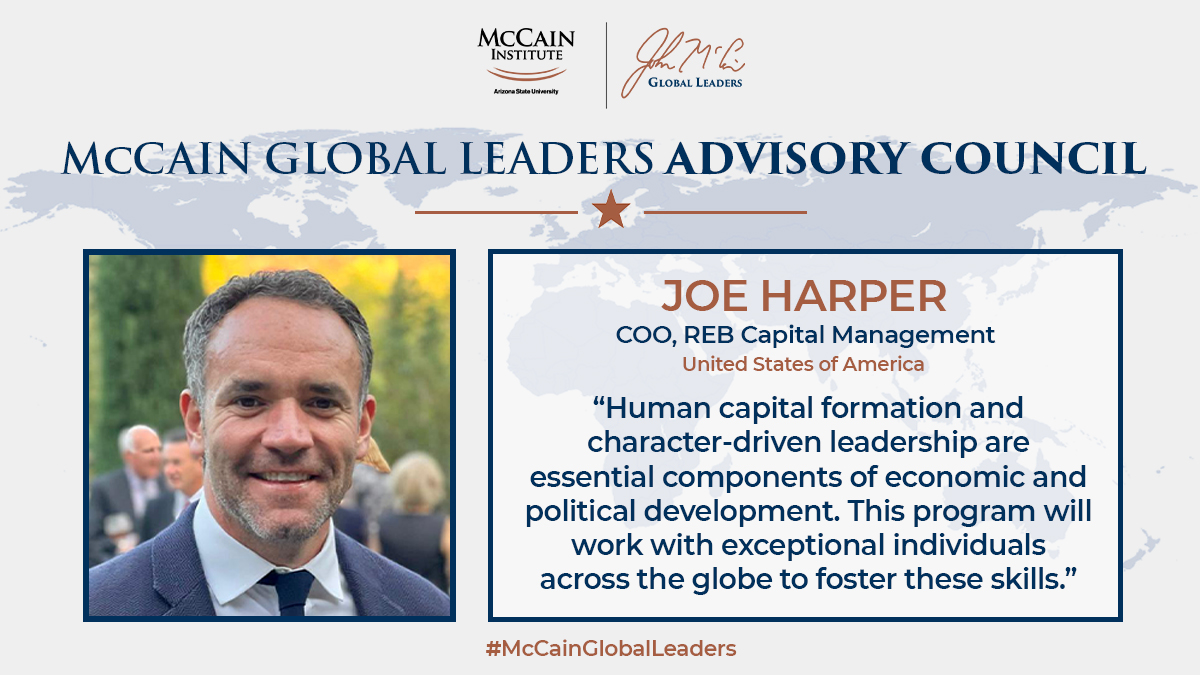
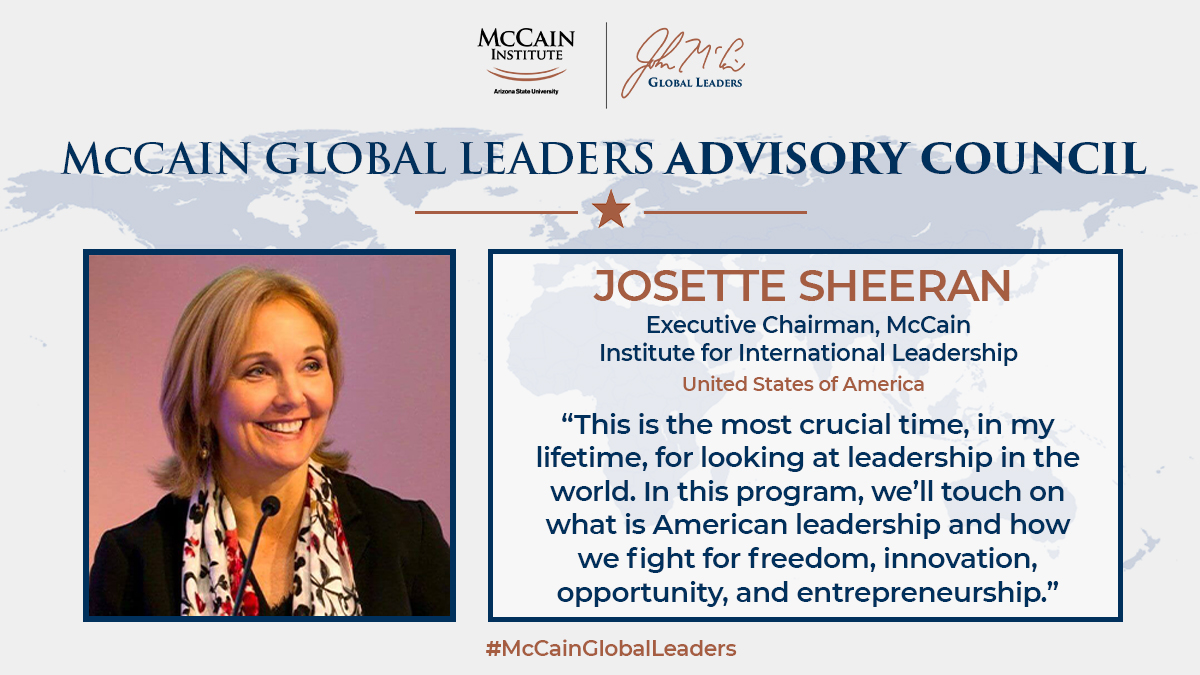
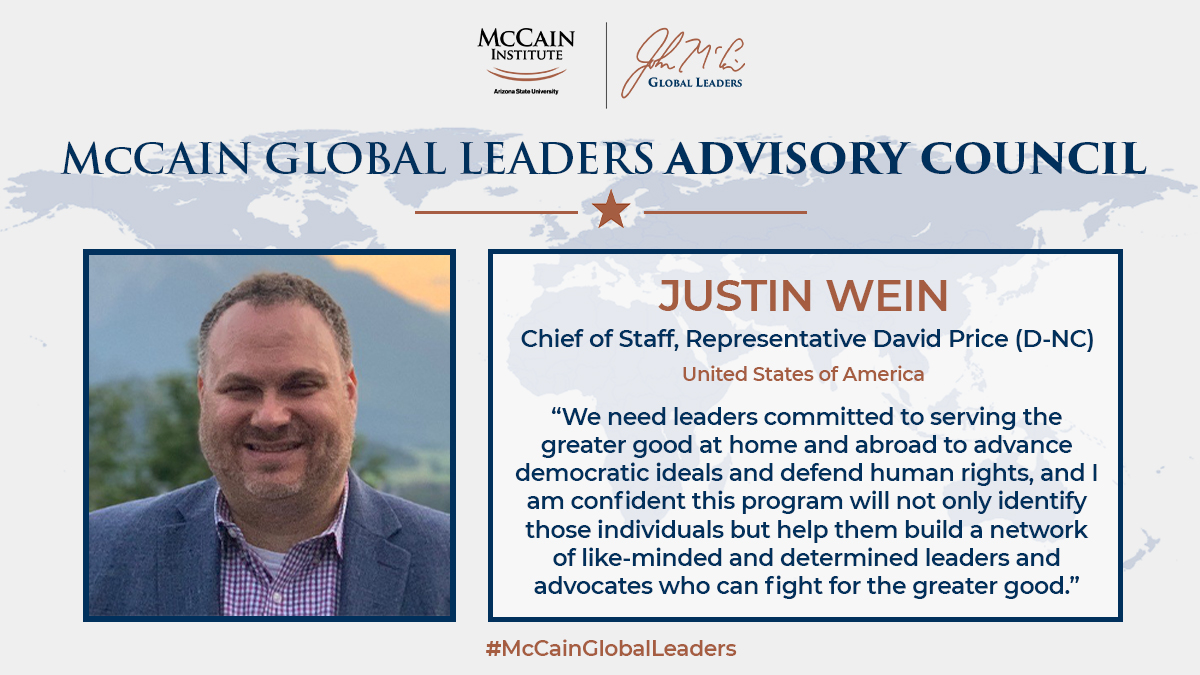
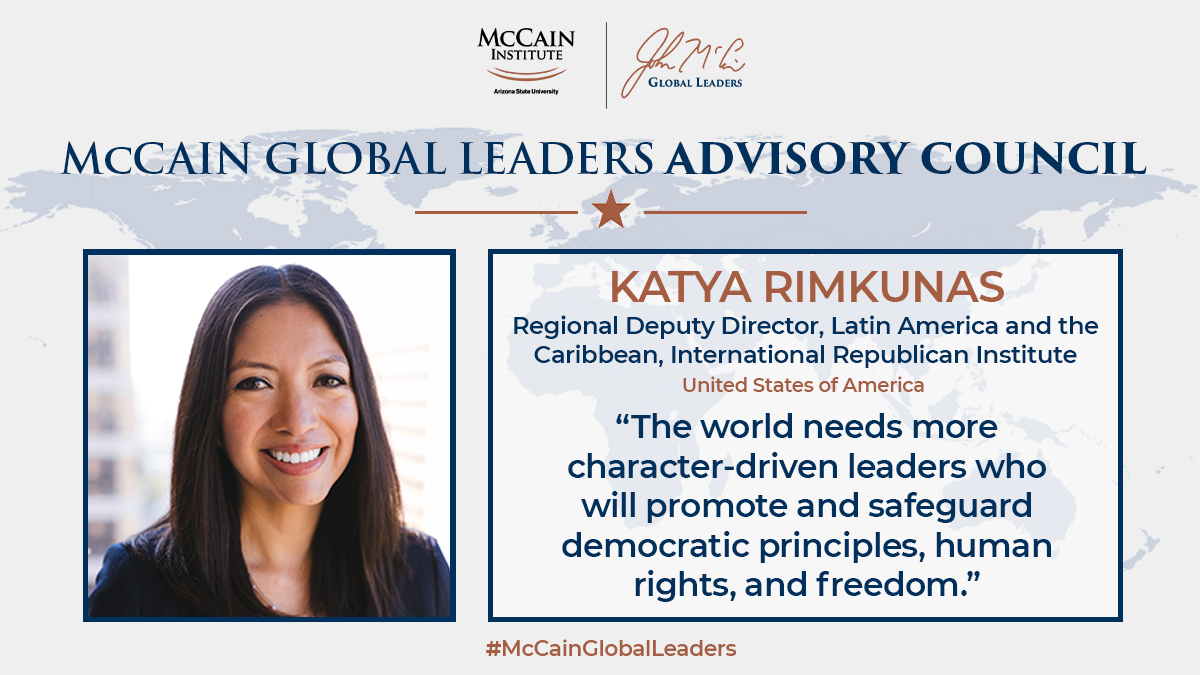
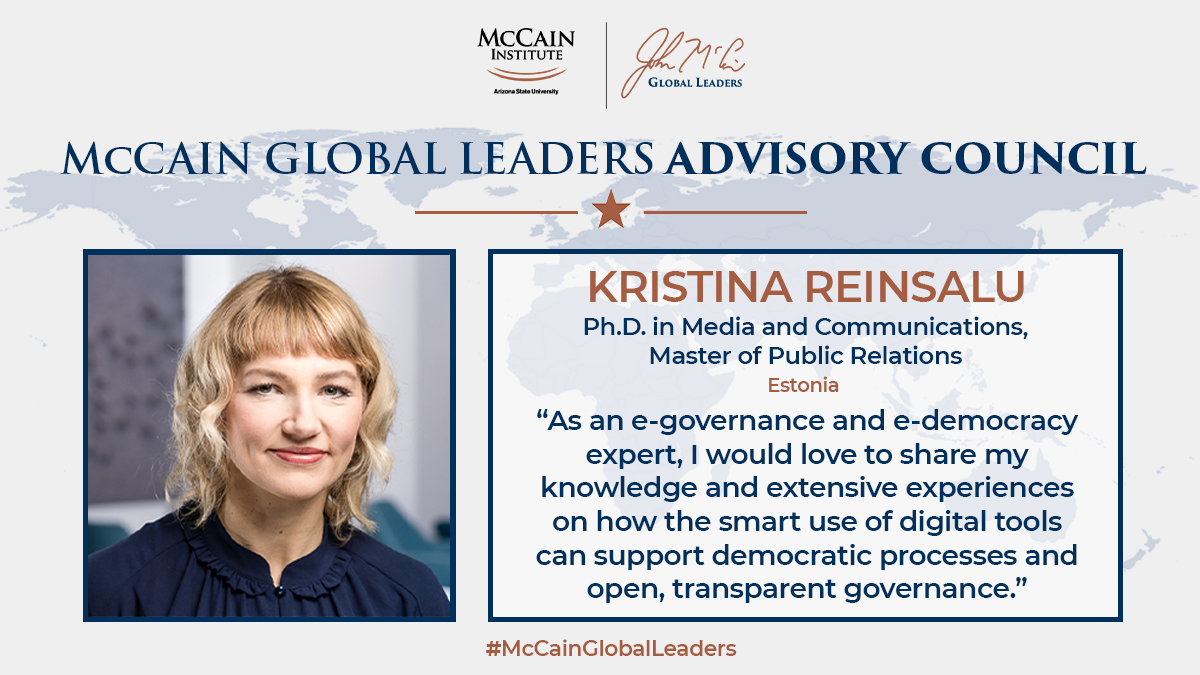
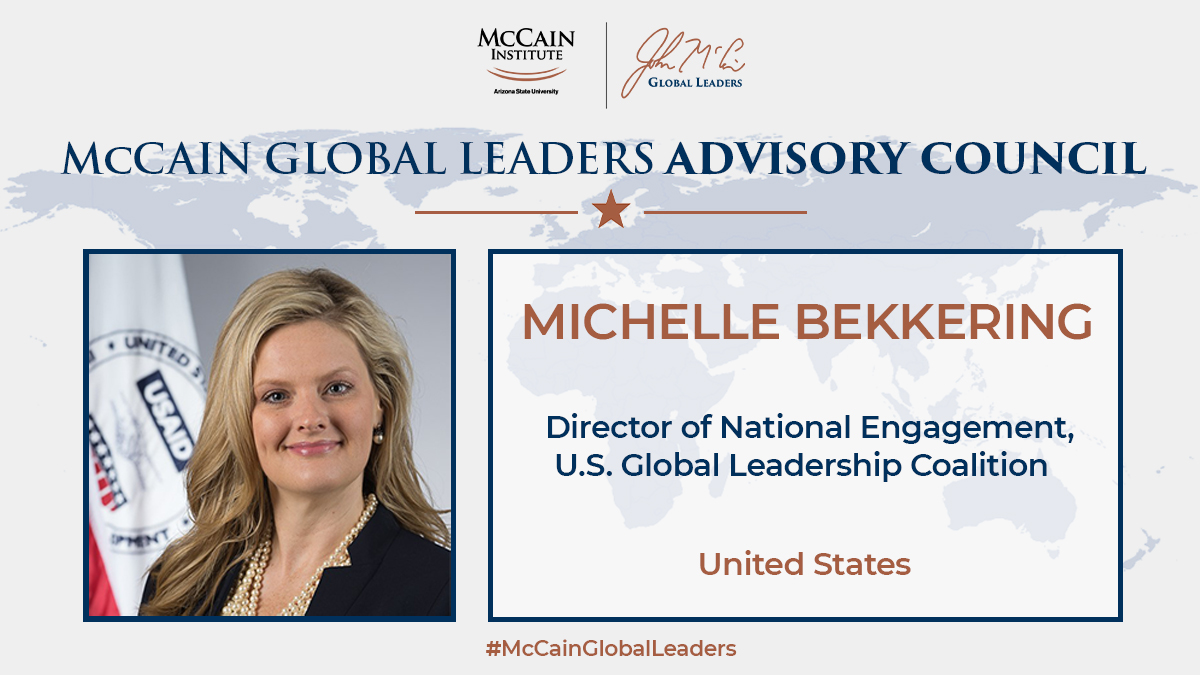
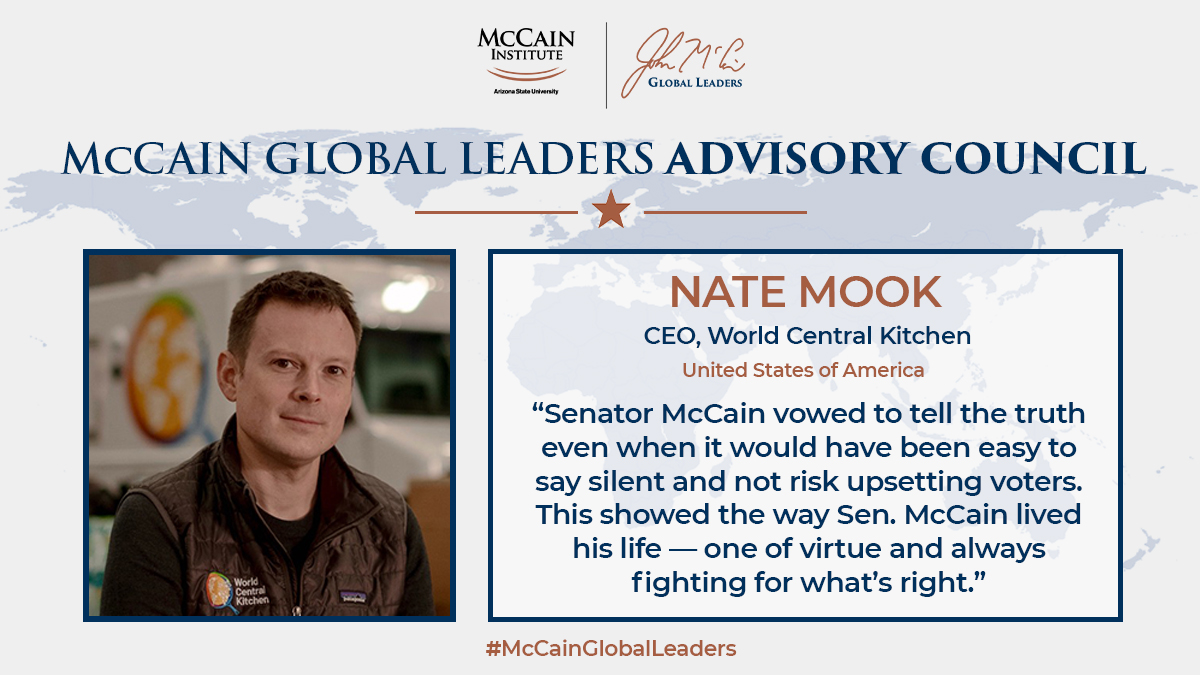




The National Security & Counterterrorism Fellowship program brings together the bright and brightest emerging leaders from the Five Eyes nations to build an enduring community of young national security professionals. In November 2021, the fellowship program welcomed its second cohort of leaders to Washington, D.C.
from four Five Eyes countries in the NSCT fellowship network
This second cohort of fellows hails from four of the Five Eyes countries – the United States, the United Kingdom, Australia and Canada – and brings with them a wealth of experience in national security, intelligence and counterterrorism. They join a growing network a total of 26 Fellows from across four of the Five Eyes nations.





“One of the greatest benefits of the McCain Fellowship is the opportunity to learn from incredible and inspiring leaders across the National Security realm. Hearing these leaders talk about how their values have driven their leadership is truly motivating as I think about the type of leader I’d like to be.”
– 2021-22 Fellow Padmini Rajan, U.S. Government
“The other fellows and McCain Institute team fostered a unique environment where FVEY partners can come together, learn from each other, and forge relationships that'll be beneficial in the short, medium, and long term. After just one week in-person with the group, I returned to my day job with more perspective on the future of counterterrorism and national security and a clearer understanding of my place within the broader community.”
– 2021-22 Fellow Audrey Alexander, Researcher & Instructor, Combatting Terrorism Center, U.S. Military Academy
“The programme was an invaluable opportunity to understand how our close allies approach shared challenges. Learning with and from experts across the Five Eyes community was a unique experience, and I have no doubt that the relationships we built will have a long- lasting impact at individual and international levels.”
– 2020-21 Fellow Chris Selim, Head of Operational Policy and Secretariat, Home Office, United Kingdom
“There is no doubt that the experiences I gained as a fellow have given me an incredible perspective to advance the study and debate of today’s complex intelligence, security and human rights issues, and inspire a new generation of security experts ready to tackle the ever-evolving war on terror.”
– 2020-21 Fellow Leah West, lecturer on National Security and Intelligence, Norman Patterson School of International Affairs at Carleton University, Canada
The 14 members of the 2021-22 cohort began their program with a week-long module in Washington, DC. The fellows met with senior officials at key government agencies, as well as a wide range of national security leaders, practitioners and scholars. We welcomed in-person guests, such as former Under Secretary of Defense for Policy Michèle Flournoy, former Director of Central Intelligence John Brennan and current National Counterterrorism Center Director Christy Abizaid. Using videoconferencing technology, fellows engaged with virtual speakers, such as former Head of U.S. Special Forces Command Admiral William McRaven, Deputy Attorney General Lisa Monaco, Director of National Intelligence Avril Haines, and former U.S. Secretary of Defense and current John S. McCain Distinguished Fellow Mark Esper.
The module also included several site visits. The fellows met with Deputy Director David Cohen at the Central Intelligence Agency, with three members of the National Security Council at the White House, and with Counselor Derek Chollet at the U.S. State Department. They also participated in a leadership Monuments Walk on the National Mall.
Engagements with each of the speakers touched on specifics related to current challenges and opportunities in the national security field, but also on broader themes of character-driven leadership. The week also gave fellows the opportunity to build strong relationships with one another, strengthening a network of emerging leaders across the Five Eyes.
This weeklong convening was the first of three gatherings that will be held over the course of the fellowship, with gatherings planned in London in May 2022 and in Canberra in August 2022.
With a stalwart belief that strong transatlantic alliances make the world a safer place, the McCain Institute hosts two new conversation series to promote the importance of enduring relationships with America’s alliances and to build public awareness around one of the most serious threats to democracy: mis-, dis- and mal-information.
President Joe Biden made his first overseas trip to Europe to attend the G7, NATO and EU Summits, as well as met with Russian President Vladimir Putin. The world’s eyes looked to Europe as the trip represented the United States’ potential return to a more traditional approach to its transatlantic alliances. To continue the critical work of Senator John McCain on this issue, the McCain Institute hosts a public conversation series between Dr. Mark T. Esper, the John McCain Distinguished Fellow and former U.S. Secretary of Defense, and experts on various issues related to challenges and threats to U.S. national security – a rising China, increasing international authoritarianism, the global plague of disinformation, etc.
NATO and its members are facing a growing threat in the form of Mis-, Dis-, and Mal-information (MDM) campaigns that can be traced back to authoritarian regimes and their proxies. Much of this “weaponized” information seems aimed at weakening confidence in member governments and in the alliance itself. While Russia poses the most immediate threat, China and others are also engaged in these antidemocratic campaigns. One important step in countering MDM is measuring the public’s awareness of the threat. This is difficult because efforts are increasingly sophisticated, subtle, and coordinated. To counter this threat, NATO and its members must measure and build public awareness of MDM and clearly communicate NATO objectives especially younger populations in NATO member states.
Below are the first and second installments in a four-part series of conversations covering NATO and building public awareness of mis-, dis- & mal-information.
These events are funded in part by a grant from the United States Department of State – NATO Mission. The opinions, findings and conclusions stated herein are those of the author[s] and do not necessarily reflect those of the United States Department of State.
The Institute was privileged to welcome Secretary Mark T. Esper, former Secretary of Defense and Secretary of the Army, as the inaugural John S. McCain Distinguished Fellow. We are equally honored to announce the Honorable Julie Bishop, former Foreign Minister of Australia as the 2021 Kissinger Fellow.
Our programs and leadership initiatives are delivering real, tangible results – not just in Arizona and Washington, DC, but throughout the country and the world. Using social media and a new strategy of media engagement, we are continuing the conversations of the ideas and causes Senator John McCain dedicated his life to serving.
At the core of our strategy is constructive engagement and convening experts. By hosting forums and events that assemble subject-matter experts, we can better promote our values through solution-oriented and substantive conversations. The Coronavirus Pandemic provided us the opportunity to pivot and create virtual content that helped make these in-depth conversations more accessible.
We launched its successful virtual book talk series where Institute leaders interview authors of important newly released books on American politics, policy and leadership with the intention to engage the American people in a dialogue that affirms the importance of character-driven leadership and America’s leadership in the international community.
355 Attendees
As a professor, author, international democracy organization chair, U.N. ambassador – not to mention America’s 64th secretary of state and highest-ranking woman in the history of the U.S. government at that time – Madeleine Albright has played a role in nearly every major foreign policy debate of our time. Along the way, she’s learned lessons, gained insights and managed to keep her sense of humor.140 Attendees
This event featured McCain Institute Board of Trustees Chair Cindy McCain alongside McCain Institute Executive Chairman Ambassador Josette Sheeran for a discussion of her new book “Stronger: Courage, Hope, & Humor in My Life with John McCain.”
186 Attendees
Washington Post Foreign Policy Columnist and CNN Political Analyst Josh Rogin joined Ambassador Mark Green to discuss his new book, “Chaos Under Heaven: America, China and the Battle for the 21st Century,” in the latest installment of the McCain Institute’s Authors & Insights Book Talk Series. As one of America’s preeminent foreign policy journalists, Rogin has covered the U.S.-China relationship from both sides of the Pacific and uses that experience to take a deep look at the past and future of this critical great power relationship.
285 Attendees
With the rise of authoritarianism in many parts of the world, the need for a renewed commitment to free and open democracy has never been clearer. In “Twilight of Democracy: The Seductive Lure of Authoritarianism,” Anne Applebaum dissects the shift of declining liberal democracies and rising authoritarianism and argues that before reestablishing the commitment to democratic values globally, we need to reaffirm it back here in the United States.229 Attendees
Mark Salter has collaborated with John McCain on all seven of their books, including The Restless Wave, Faith of My Fathers, Worth the Fighting For, Why Courage Matters, Character Is Destiny, Hard Call, and Thirteen Soldiers. For 18 years, Salter served as Sen. McCain’s speechwriter and advisor in both the U.S. Senate and on the campaign trail.287 Attendees
When making critical national security decisions, what role should principles of democracy, freedom and human rights play in the decision-making process? As the 26th National Security Advisor to the President, H.R. McMaster constantly considered this question and more as he helped shape American foreign policy from inside the West Wing.185 Attendees
In the first edition of the McCain Institute’s Authors & Insights event series, former World Bank President Robert Zoellick joined Ambassador Mark Green to discuss his newest book, “America in the World: A History of U.S. Diplomacy and Foreign Policy.” Having served as deputy secretary of state and U.S. trade representative throughout his career, Zoellick has had unique and consistent insight into American decision-making in the foreign policy arena and can speak to what the country’s future aspirations should be.
196 Attendees
President George H.W. Bush’s Chief of Staff Jean Becker and White House Correspondent for Gray Television and McCain Institute Media Fellow Jon Decker discussed Becker’s newest book, “The Man I Knew: The Amazing Story George H.W. Bush’s Post-Presidency,” a vibrant behind-the-scenes look into the ups and downs of heading up the office of a former president by one of the people who knew him best.

In the spirit of debate and open forums, Straight Talk Live convened a panel of experts to discuss current issues in American politics. Featuring prominent experts ranging from campaign managers to pollsters to a former FEC Chairman, we hosted two Straight Talk Live forums in 2020 to discuss the historic election and implications.